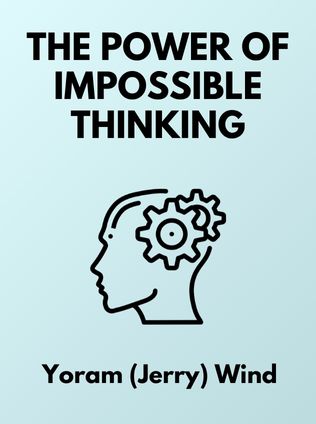
The Power of Impossible Thinking
Transform the Business of Your Life and the Life of Your Business
By Yoram (Jerry) Wind,
Published 07/2004
About the Authors
Yoram (Jerry) Wind, Colin Crook, and Robert Gunther bring together their extensive experience in business and academia to co-author The Power of Impossible Thinking. Jerry Wind, a professor at The Wharton School of the University of Pennsylvania, has authored over 20 books on topics ranging from marketing to organizational change. Colin Crook, also a senior fellow at Wharton, serves as a consultant to businesses and governments, providing strategic advice and insights. Robert Gunther, a seasoned business writer, has co-authored several influential books, including Buyout and Profiting From Uncertainty. Together, these authors leverage their diverse backgrounds to explore how shifting mental models can transform lives and organizations.
Main Idea
The core premise of The Power of Impossible Thinking is that our mental models—internal representations of external reality—shape how we perceive and interact with the world. These models influence every decision we make, from personal choices to business strategies. The authors argue that by understanding, challenging, and changing our mental models, we can unlock new opportunities and navigate complex and evolving environments more effectively. This process of mental model transformation is crucial for innovation, personal growth, and organizational success.
Table of Contents
- Mental Models Shape Your World
- A Process for Impossible Thinking
- Recognize the Power and Limits of Mental Models
- Keep Your Mental Models Relevant
- Overcome Inhibitors to Change
- Transform Your World
- Putting Models to Work
Mental Models Shape Your World
Mental models are not just passive filters; they actively shape our experiences and actions. The authors illustrate this with a simple yet profound example: imagine walking down a dark street at night and hearing footsteps behind you. Instinctively, you might feel fear, assuming a potential threat based on past experiences or stories you've heard. However, upon turning around, you recognize a friend. The scenario shifts from fear to relief, not because the situation changed, but because your mental model of the situation did. This demonstrates how our perceptions can dramatically influence our reality.
"The image of the pursuing attacker was transformed into that of a friend. How could so little have changed in the situation, yet so much have changed in the way you viewed it?" – Yoram (Jerry) Wind
The authors emphasize that mental models are crucial in every aspect of life. Whether in personal relationships, professional settings, or societal issues, these models determine how we interpret information and make decisions. For instance, a business leader's perception of market trends can either limit or expand their strategic options. Recognizing the role of mental models is the first step towards harnessing their power for positive change.
Sign up for FREE and get access to 1,400+ books summaries.
You May Also Like
The Subtle Art of Not Giving a F*ck
A Counterintuitive Approach to Living a Good Life
By Mark MansonRich Dad Poor Dad
What the Rich Teach Their Kids About Money - That the Poor and Middle Class Do Not!
By Robert T. KiyosakiHow To Win Friends and Influence People
The All-Time Classic Manual Of People Skills
By Dale CarnegieFreakonomics
A Rogue Economist Explores the Hidden Side of Everything
By Steven D. Levitt and Stephen J. Dubner



















